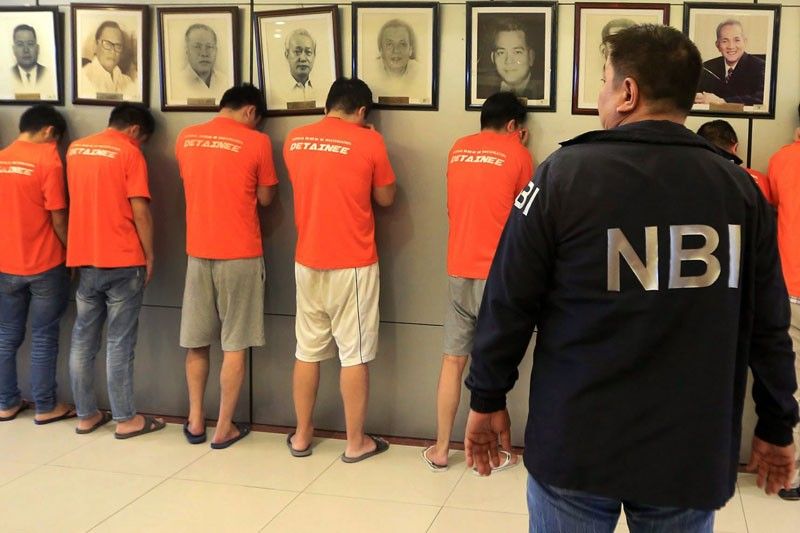Gov’t cracks down on illegal foreign workers

MANILA, Philippines — A crackdown on foreigners illegally staying and working in the Philippines has begun with the arrest of 15 Chinese online gambling workers in separate raids over the weekend in Manila and Pampanga by operatives of the National Bureau of Investigation (NBI).
The arrests came amid concerns raised by several quarters over the influx of Chinese nationals who were reportedly edging out local workers from limited job opportunities. A Senate panel is investigating the matter.
NBI deputy director Ferdinand Lavin presented to the media yesterday Yu Size, Lin Hai Yang, Li Jun Qing, Yu Wen Quiao, Xiao Wen Lao, Cai Shut Rong, Lin Jingmin, Ju Shi Liu, Quo Zai Web and Xiao Jian Zero who were arrested last Nov. 23 in a house in Pulong Gatulad, Angeles City, Pampanga, while Pan Joanne, Pan Taiyuan, Jie Ku, Shengbo Zhang and Jian Lou Zhou were nabbed inside the Alpha Grandview Condominium in Malate, Manila the previous day.
The raids stemmed from a complaint by foreign nationals based in Manila, according to Lavin. He did not identify the foreign tipsters.
The arrest was covered by a warrant and was carried out after a careful surveillance operation, the NBI stressed.
The raiding team seized desktop computers and cell phones used in the operation of online games.
The suspects were charged with violation of Republic Act 10175 (cyber crime) and RA 8484 or the law regulating the use of access devices.
As part of the crackdown, the Bureau of Immigration (BI) has deployed an unspecified number of intelligence officers across the country to check reports on the presence of illegal aliens in many provinces.
BI spokesperson Dana Sandoval said BI chief Jaime Morente has ordered the “strengthening of our Intelligence Division” and the sending of personnel “all over the Philippines to locate” foreigners illegally working in the country or with expired visas or questionable travel documents.
She said the job of the bureau’s intelligence unit “is no longer focused in Metro Manila since we have been receiving information that there were some (illegal aliens) hiding in the provinces.”
Much of the information they received, she said, came from concerned citizens.
“We also very much welcome the information coming from the concerned citizens,” she said.
“In fact, recently we have had operations wherein the information was tipped by a concerned citizen,” she pointed out.
She added the BI is calling on citizens to report the presence of suspicious foreign workers or residents in their neighborhood.
Records showed that as of September 2018, a total of 393 aliens have been arrested – an increase from the 173 arrests recorded in 2017.
The BI is also coordinating with the Department of Labor and Employment (DOLE) and other government agencies for the task of preventing the entry of illegal aliens and apprehending those already in the country.
The Chinese embassy only provides authorities with information about Chinese nationals with criminal record or pending cases who may have traveled to the Philippines to escape prosecution or punishment.
BI records also showed thousands of Chinese nationals have applied for 9G visas or pre-arranged employment visa.
A foreigner is required to secure a 9G or pre-arranged employment visa if he is being petitioned by his employer to work in their Philippine office.
More than 46,470 Chinese have applied for 9G visas since President Duterte’s assumption into office in 2016. Only close to 3,000 Chinese applied for 9G visas in 2016. The figure swelled to 20,965 in 2017 and 22,599 this year.
Duterte has been vocal about his affection for China, which has promised funding for his administration’s ambitious infrastructure program.
Meanwhile, Sen. Leila de Lima has urged the Senate games and amusement committee to re-examine and possibly revise laws regulating the operations of casino-entertainment resorts, online gaming sites and junket casinos to prevent the country from being used as launching pad for money laundering, fraud and other illegal activities.
De Lima recalled the bribery scandal involving self-proclaimed online gaming industry expert Wenceslao Sombero Jr., who was caught on CCTV handing over payoff money to immigration officers to facilitate the release of Chinese nationals arrested for illegally operating online gambling in the country in 2016.
She said Chinese gambling companies and gamblers thrive in the country because gambling is illegal in China.
“The possibility of money laundering also concerns some industry players as the shroud of internet anonymity coupled with loose regulatory policies may leave the industry susceptible to fraud and other illicit activities associated with high-stakes gambling,” she said in filing Senate Resolution No. 953. – With Cecille Suerte Felipe
- Latest
- Trending






























